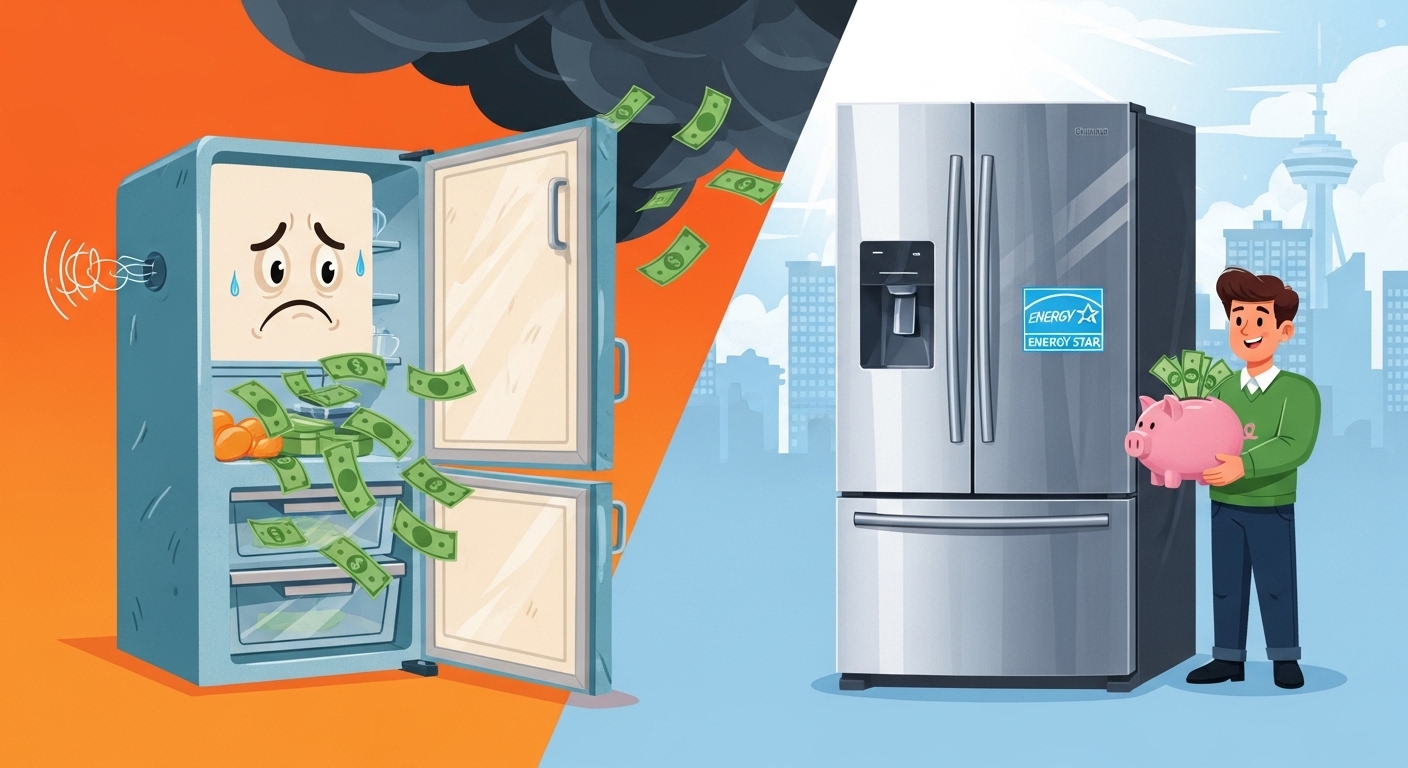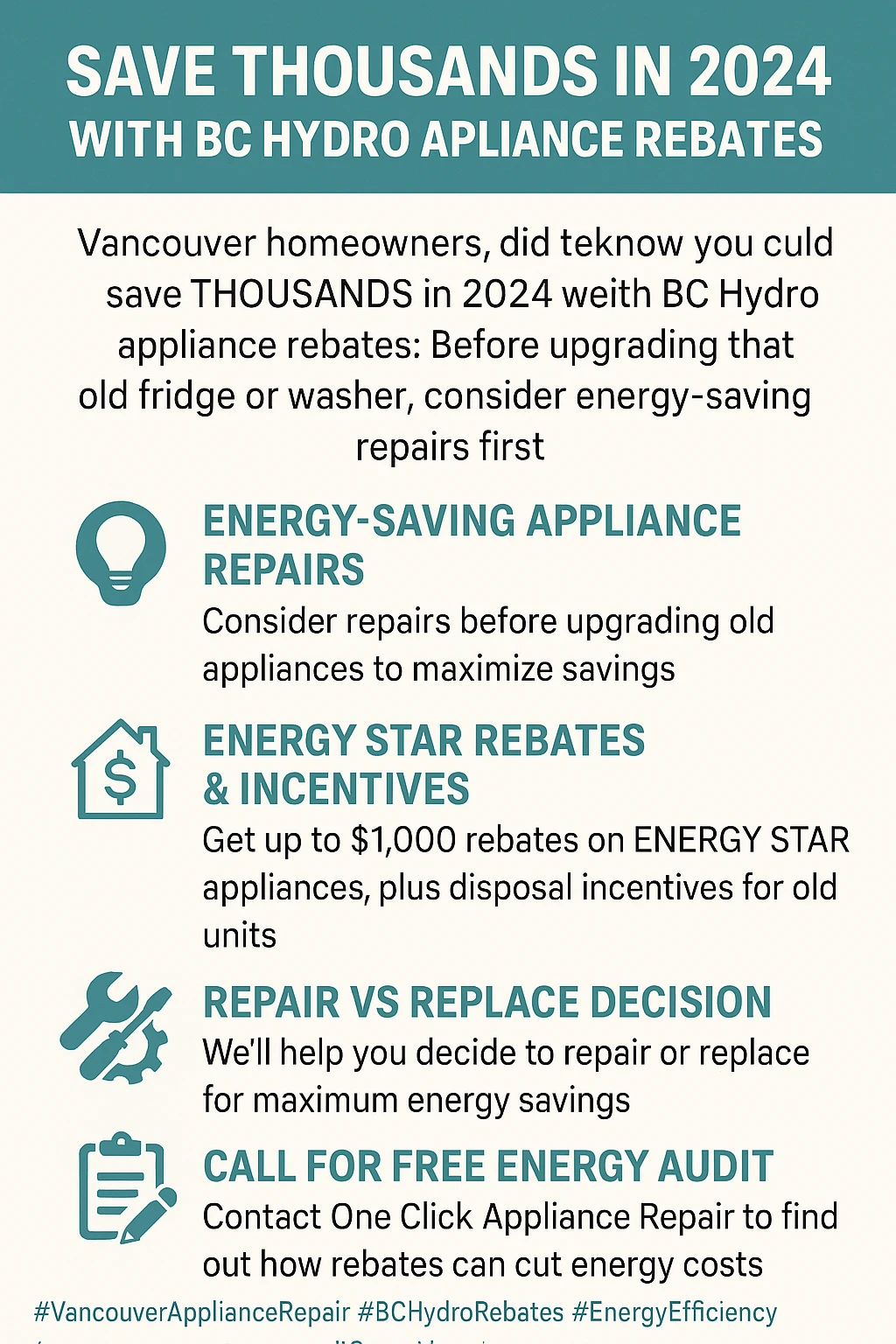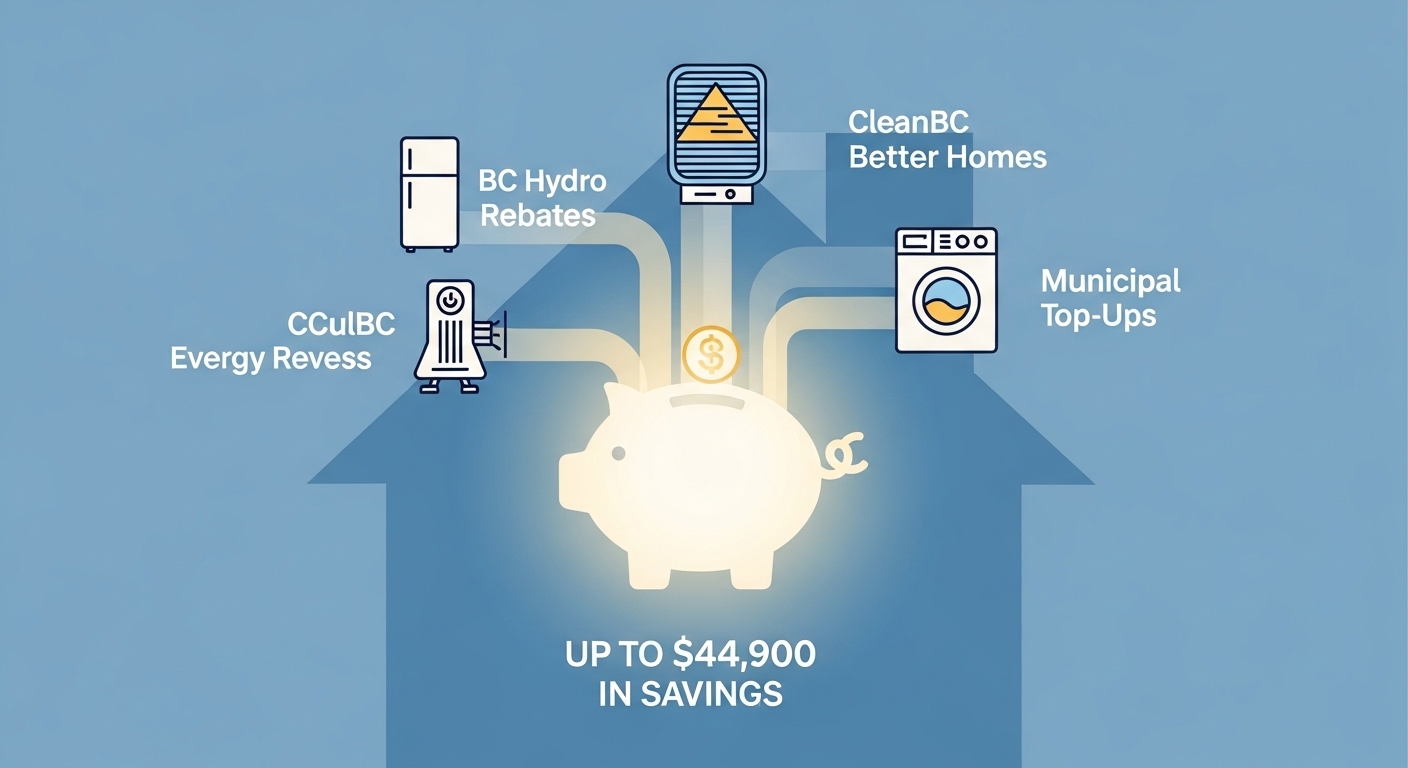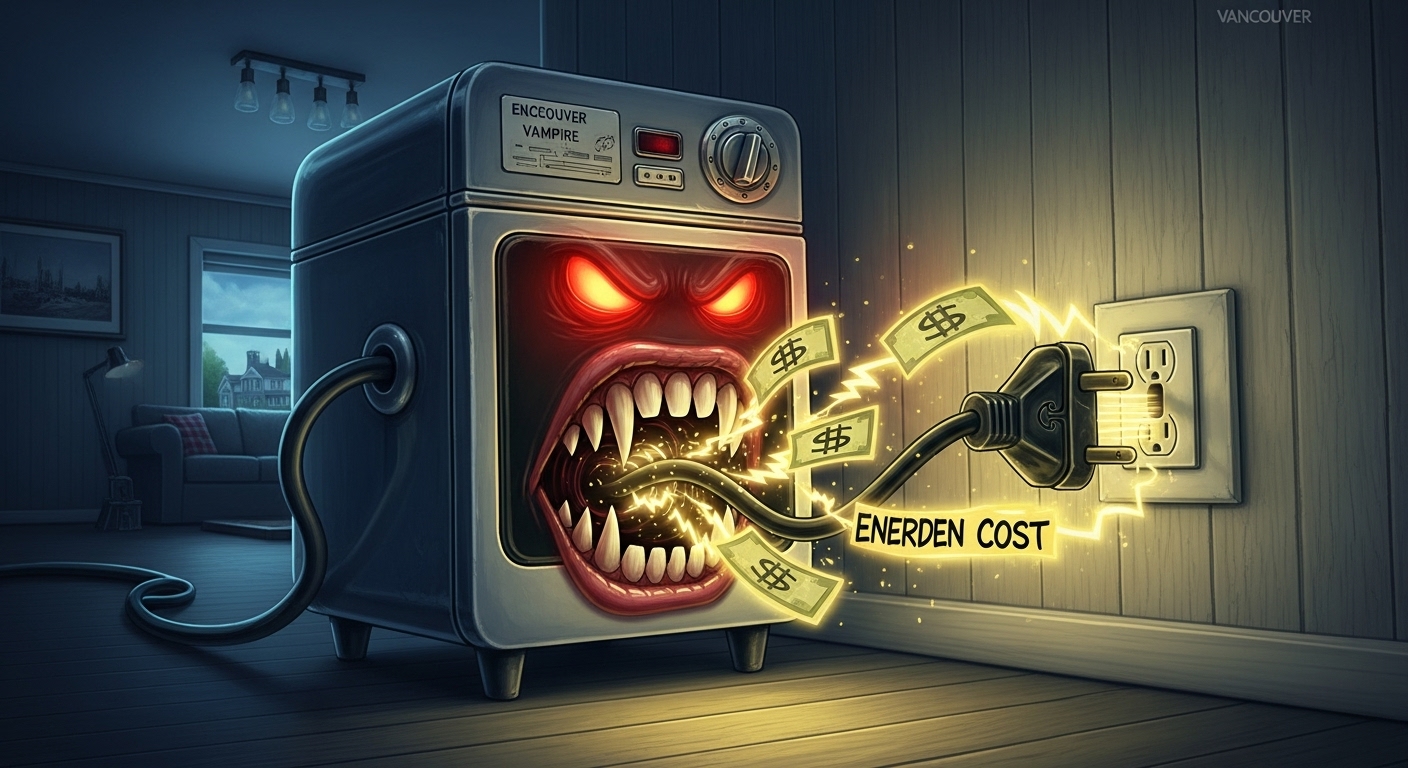Vancouver’s Energy Rebate Programs: How Upgrading vs Repairing Your Old Appliances Can Save You Thousands in 2024
Tired of sky-high energy bills from that ancient fridge that sounds like it’s hosting a techno rave? You’re about to discover how Vancouver’s incredible rebate programs can transform your wallet-draining appliances into money-saving machines – and we’re talking serious cash here!
Picture this: you’re standing in your kitchen at 2 AM, wondering if that mysterious humming sound is coming from your 15-year-old refrigerator or if you’ve accidentally summoned some sort of energy vampire. Meanwhile, your electricity bill keeps climbing higher than a West Coast gas price, and you’re caught in that classic homeowner dilemma – repair the old beast or bite the bullet and upgrade? Here’s the plot twist: with Vancouver’s current rebate landscape, upgrading might actually cost you less than fixing that power-hungry dinosaur.
I’ve been diving deep into Vancouver’s energy rebate ecosystem, and let me tell you, it’s like discovering a hidden treasure map for homeowners. We’re talking about programs that can put up to $44,900 back in your pocket for energy-efficient upgrades. That’s not a typo – forty-four thousand, nine hundred dollars. Between BC Hydro’s appliance rebates, CleanBC Better Homes programs, and municipal top-ups, Vancouver homeowners are sitting on a goldmine of opportunities to slash their energy costs while upgrading to appliances that don’t sound like they’re plotting world domination.

The timing couldn’t be better either. With older appliances potentially costing you $100-300 annually in unnecessary energy expenses, and modern Energy Star models delivering 15-30% better efficiency than standard units, the math is getting pretty compelling. Some refrigerators show up to 40% improvement over units from just 10-15 years ago. When you factor in the rebates and long-term energy savings, suddenly that repair quote starts looking less like a bargain and more like throwing good money after bad.
Key Outtakes:
- Vancouver homeowners can access up to $44,900 in combined rebates through BC Hydro, CleanBC, and municipal programs for energy-efficient appliance upgrades
- Modern Energy Star appliances use 15-30% less energy than standard models, with some categories like refrigerators showing 40% efficiency improvements over 10-15 year old units
- Older appliances can cost Vancouver households $100-300 annually in unnecessary utility expenses, making strategic upgrades more cost-effective than repairs
- The 50% repair rule (replace when repair costs exceed half the new appliance price) becomes obsolete when factoring in available rebates and energy savings
- Vancouver’s marine climate accelerates appliance degradation, potentially shortening optimal replacement timelines by 2-3 years compared to drier regions

Understanding Vancouver’s Energy Rebate Ecosystem
Let’s be real – navigating Vancouver’s rebate programs feels a bit like trying to solve a Rubik’s cube while riding a unicycle. But stick with me, because once you crack the code, you’re basically printing money. The foundation of this whole beautiful mess starts with BC Hydro’s massive $700 million investment in energy efficiency programs over three years. That’s serious commitment to helping you ditch those energy-guzzling appliances.
BC Hydro’s Power Smart program has been crushing it since 2008, saving over 7,000 gigawatt hours – enough to power more than 700,000 homes. That track record isn’t just impressive stats for their annual report; it’s proof that these programs actually work and that British Columbia is doubling down on energy efficiency. For Vancouver homeowners, this translates into rock-solid rebate programs that aren’t going anywhere anytime soon.
The basic BC Hydro appliance rebates might seem modest at first glance – we’re talking $25 to $100 for qualifying refrigerators, clothes dryers, and washing machines. But here’s where it gets interesting: if you live in Vancouver, North Vancouver, West Vancouver, Richmond, Coquitlam, or New Westminster, you can snag an extra $50 for select Energy Star clothes washers. It’s like getting a geographic bonus just for living in the right postal code.

But the real magic happens when you start layering these programs. The CleanBC Better Homes program can throw up to $14,000 your way for comprehensive energy efficiency upgrades, especially if you’re converting from fossil fuel systems to electric alternatives. And if your household income qualifies, the Energy Savings Program can cover up to 100% of upgrade costs with rebates reaching that mind-blowing $44,900 figure.
Here’s what most homeowners miss: these programs aren’t just about individual appliances. They’re designed to reward holistic approaches to energy efficiency. Install a heat pump, upgrade your water heater, improve your insulation, and suddenly you’re eligible for bonus rebates that can stack up faster than your utility savings. The Two Upgrade Bonus adds $300, while the Home Energy Improvement Bonus can contribute up to $2,000 for comprehensive projects.
Municipal governments are also throwing their hats in the ring with top-up programs that recognize local benefits from improved energy efficiency. The City of Vancouver offers an additional $1,500 for electric heat pump conversions and $1,000 for electrical service upgrades. North Vancouver goes even bigger with $2,000 for heat pump conversions. These municipalities understand that when residents use less energy, it reduces strain on local infrastructure and improves air quality for everyone.
The Real Cost of Keeping That Old Appliance
Now that we’ve established that Vancouver is basically throwing money at you to upgrade your appliances, let’s talk about why that old refrigerator is secretly bankrupting you. This is where the conversation gets really interesting, because most homeowners dramatically underestimate the hidden costs of maintaining older appliances.
Remember that 1990s refrigerator I mentioned earlier? That energy-hungry beast is consuming approximately 1,044 kWh annually, while a modern 2010 Energy Star model sips just 369 kWh. At Vancouver’s current electricity rates, you’re paying roughly $95 more per year just to keep your food cold with outdated technology. Over the typical 15-year replacement lifespan of a refrigerator, that’s nearly $2,000 in completely unnecessary electricity expenses.
Energy vampire appliances are the silent budget killers that most Vancouver homeowners never think about. These phantom loads from devices that continue drawing power when supposedly ‘off’ can waste up to 10% of your household electricity consumption. That translates to $100-300 annually in completely avoidable costs. Your phone chargers, coffee machine with that digital display, and gaming console maintaining its network connection are all contributing to this energy vampire feast.

But it gets worse – or better, depending on how you look at it. Clothes washer efficiency improvements between 2000 and 2019 decreased average energy consumption by 83.9%, dropping from over 600 kWh annually to just 134.3 kWh for modern units. If you’re still running an early 2000s washing machine, you’re potentially paying five times more electricity costs than necessary for this single appliance. That annual overpayment likely exceeds what you’d spend on repairs and definitely justifies replacement even for a functioning unit.
Vancouver’s coastal climate adds another layer of complexity that most cost analyses miss. Our mild, humid environment makes dehumidifiers and heat pumps operate more efficiently than in drier climates, giving energy-efficient systems superior performance opportunities. However, that same marine climate accelerates appliance degradation through increased corrosion of metal components and faster seal deterioration. This is particularly problematic for appliances experiencing frequent temperature changes, like refrigerators and dryers.
The hard water conditions prevalent in Richmond, Burnaby, and other Vancouver suburbs create scale buildup that damages heating elements, pumps, and internal components. This mineral accumulation doesn’t just reduce efficiency – it can increase energy consumption by 15-25% before major failures occur, creating compounding hidden costs that often go unnoticed until replacement becomes unavoidable.
Here’s the kicker: a typical Vancouver home with an aging refrigerator, washing machine, and dryer could face $300-500 in annual energy overpayments compared to modern efficient models. Over just five years, these excess costs approach or exceed the full replacement cost of efficient appliances, even before considering the avalanche of rebates available to offset upgrade expenses.

